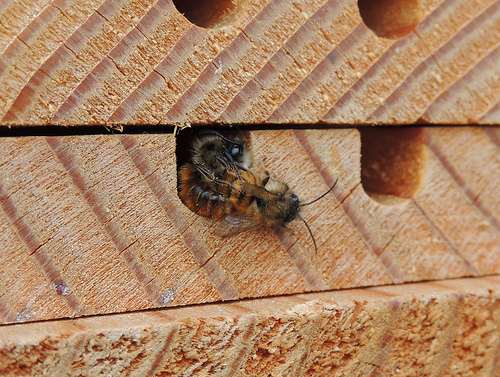Bees in the Fridge?!
 We spend a lot of time talking about honeybees here at Networx, because they're fantastic pollinators and they produce a tasty byproduct. However, honeybees are just one among over 20,000 recognized bee species, all of which play valuable environmental roles. If you want to take advantage of the benefits of bees without some of the drawbacks of honeybees, have you considered mason bees?
We spend a lot of time talking about honeybees here at Networx, because they're fantastic pollinators and they produce a tasty byproduct. However, honeybees are just one among over 20,000 recognized bee species, all of which play valuable environmental roles. If you want to take advantage of the benefits of bees without some of the drawbacks of honeybees, have you considered mason bees?
Mason bees don't produce honey, but they are superb pollinators, and they'll keep a garden in great shape. Furthermore, they don't sting, making them a great choice for companions in an area where keeping honeybees isn't feasible or there's a great deal of concern about stings (for example, if a member of the family has an extreme bee allergy). If you live in a concrete jungle, there's no room for a honeybee hive, but a mason bee block will fit right in! They're also pretty low-maintenance, a trait that makes them popular among some gardeners who want to keep bees around, but don't have the time or energy to maintain a hive.
How easy is it to keep mason bees? Get a block of wood, drill some holes in it, and hang it up. Face it towards the sun, and provide the bees with a source of mud to help them build their homes. That's it! Seriously. The bees will happily take up residence and start nesting in the block, and you might have several such blocks around the garden. You may order packets of mason bees from a variety of sources: we recommend finding a seller in or near your state in order to get an appropriate species of mason bee.
When the weather starts to get cold, you can gently move the nest to an area like the garage to protect the bees over the course of the winter. This increases the chance that your little insect friends will survive, and it also protects them from parasites, pests, and predators. In the spring, the bees can be brought back out to start pollinating again.
Here's the tricky part, though. Mason bees go into hibernation when it gets cold, but when it starts warming up, they awake and emerge. If there's a sudden warm spell in late winter or early spring, the bees will wake up and venture out, but they won't find pollen, because there won't be any flowers out yet. As any Dallas HVAC contractor knows, warm weather rarely arrives smoothly, and there are often a few false starts before spring really gets going. Consequently, the bees will die, and you'll have to go through the process of ordering a new packet and nurturing them.
So, this is where the refrigeration part comes in. It's possible to keep bees in a state of forced hibernation by stashing them in the fridge until spring is well and truly sprung, with flowers establishing themselves and the weather staying warm. Once it is officially springtime, take the bees out, move them to a cool room in the house to gently bring them out of hibernation, and hang them outside in two to three days. Once they react to the warm weather by waking up, they'll hit the garden in search of pollen -- pollinating your plants along the way.
Keeping mason bees is a great project for beginner gardeners looking for pollinators, and for parents interested in teaching their kids about animal husbandry. Because mason bees don't sting, they can be safely handled by enthusiastic learners and people who aren't familiar with bees.
Katie Marks writes for Networx.com.
Updated April 15, 2018.
Looking for a Pro? Call us (866) 441-6648

Landscaping Average Costs
Landscapers Experiences

Successful Removal Of A Very Large Tree

Don’t Be A Goober – Hire Qualified Pros For Safe Tree Removal



